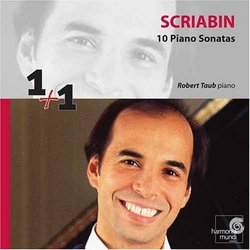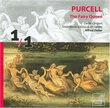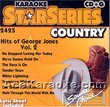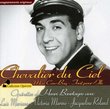| All Artists: Alexander Scriabin, Robert Taub Title: Scriabin: 10 Piano Sonatas Members Wishing: 0 Total Copies: 1 Label: Harmonia Mundi Fr. Original Release Date: 1/1/2005 Re-Release Date: 9/13/2005 Genre: Classical Styles: Chamber Music, Forms & Genres, Sonatas, Historical Periods, Classical (c.1770-1830), Modern, 20th, & 21st Century Number of Discs: 2 SwapaCD Credits: 2 UPC: 093046736620 |
Search - Alexander Scriabin, Robert Taub :: Scriabin: 10 Piano Sonatas
 | Alexander Scriabin, Robert Taub Scriabin: 10 Piano Sonatas Genre: Classical
![header=[] body=[This CD is available to be requested as disc only.]](/images/attributes/disc.png?v=a4e11020) ![header=[] body=[This CD is available to be requested with the disc and back insert.]](/images/attributes/disc_back.png?v=a4e11020) ![header=[] body=[This CD is available to be requested with the disc and front insert.]](/images/attributes/disc_front.png?v=a4e11020) ![header=[] body=[This CD is available to be requested with the disc, front and back inserts.]](/images/attributes/disc_front_back.png?v=a4e11020) |
Larger Image |
CD DetailsSimilar CDs |
CD ReviewsThe best set overall of the complete Scriabin sonatas SRS | Ohio | 04/08/2006 (5 out of 5 stars) "Regrettably, the posthumous sonatas are not included and not every performance is outstanding, but this is the best set overall. Not only does it have great sound quality (excepting the 2nd sonata where the treble notes are hard to hear), but it has some truly outstanding performances, particularly #5 and #10. #3, #4, and #6 are also particularly good. Its weaknesses are the 7th and 8th sonatas. The second movement of the second sonata is a bit awkward, too. Otherwise, this is a very nice collection. Scriabin fans should supplement it with other recordings, though. I have the following complete sets: Laredo, Taub, Ashkenazy, Hamelin, Mikhailov, Szidon, Ponti, and Ogdon. I have two discs of Glemser and Horowitz, and one disc of: Sofronitsky, Pletnev, Kocyan, Bogdonov, Florentino, Coombs, Trpceski, and Richter. Here is my list of suggested performances of the sonatas, taken from those I've heard. They are ranked from left to right: G#m posthumous: Hamelin. Ebm posthumous: Glemser. No. 1: Kocyan, then Ashkenazy, then Taub. Kocyan tells a story. Ashkenazy is passionate. Taub is darker. No. 2: Kocyan, then Glemser or Sofronitsky, then Ashkenazy. Kocyan's fluidity takes it, but Sofronitsky is artistic. Glemser's first movement is beautiful. No. 3: Laredo or Horowitz. Then Glemser or Taub. Then Ashkenazy or Sofronitsky. No. 4: Taub or Sofronitsky. The latter has more artistry, the former a more coherent and appropriate tone. No. 5: Horowitz or Taub. The former has electric genius, the latter has wonderful refinement. Hamelin's is excellent (definitely his best Scriabin performance). I've heard that Richter's is great, but I don't have it. No. 6: Richter (genius but bad sound quality), then Taub. Hamelin's is athletic and precise, although not mysterious. No. 7: Glemser, then Laredo. The former brings out all the complexity with precision, the latter is sharp and clear. I have not heard Richter's. No. 8: Ashkenazy. Then Szidon or Laredo. I've read that Sofronitsky's is good, but I don't have it. No. 9: Sofronitsky, then Horowitz (all versions), then Glemser, then Szidon and Taub. No. 10: Horowitz or Taub. Same contrast of styles between the pianists as the fifth sonata. Like the fifth, this is Taub's other brilliant performance. Other pieces: Fantasy in B minor: Glemser Vers la flamme: Sofronitsky or Horowitz, then Laredo. Piano concerto: Ugorski/Boulez, then Ashkenazy/Maazel. Both are excellent, but I give the edge to Ugorski. Poem of Ecstasy: Maazel Prometheus: Ashkenazy/Maazel" Taub's Scriabin Sonatas Alscribji | Washington, D.C. | 05/30/2006 (5 out of 5 stars) "Robert Taub gives rock solid performances of the Scriabin sonatas. He is loud when he should be, soft when he should be, fast when he should be, and slow when he should be. As a set, Taub offers one of the best next to Hamelin's set of Scriabin sonatas. Taub's set is a very even one; he is more successful though on the second disc, sonatas 6-10, than on the first disc, 1-5. For these, I would prefer the following: Hamelin (1), Richter (2), Gilels (3), Hamelin (4), and Horowitz/Hamelin (5)." Good but not brilliant M. Hendrik | Ghent, Belgium | 12/29/2008 (4 out of 5 stars) "Robert Taub has received much praise for his recording of Scriabin's complete sonatas, but while I agree that his performances are technically highly competent I cannot wholeheartedly recommend this album. For me, Taub's problem is more or less the same as Hamelin's, in that virtually none of his performances rise above a consistent "better-than-average". Only his 10th sonata ranks among the best recordings of that work. If this is the only set you would ever plan to acquire it is a decent compilation, but those interested in exploring the music of Alexander Scriabin in-depth must look elsewhere.
In what follows, a small guide for the uninitiated to thread the minefield of Scriabin recordings available. Of course, it goes without saying that these picks are highly subjective: 1. KOCYAN, ASHKENAZY: Normally Ashkenazy would be my top choice for Scriabin's 1st, but Kocyan's recording may very well be regarded as definitive. Kocyan is also one of the few successful at conveying the quiet agony of the second movement. 2. KOCYAN, SOFRONITSKY: Once again, I must give the edge to Kocyan for the best recording of this sonata. Sofronitsky's andante (the only movement he recorded) is equally brilliant, but wilder during the E major section. 3. ASHKENAZY: Arguably the most overrecorded Scriabin sonata apart from the 9th. There are probably dozens of different recordings available (Kissin, Gilels, Horowitz, etc), but Ashkenazy's is the one I keep coming back to. 4. AUSTBØ, GAVRILOV: A somewhat neglected gem among Scriabin's sonatas. The 4th is a short, "sparkly" work which is also a great deal more treacherous to perform well than it might appear. I've yet to hear a performance which is completely to my satisfaction, but until then, my surprise pick is the relatively obscure Håkon Austbø. His performance is modest but not too dull, which seems exactly what the 4th sonata requires. Otherwise, Gavrilov is also worth considering. 5. RICHTER, SUDBIN: The sonata that took the longest for me to appreciate. Richter's performance moves me more than any other, and he seems the only one who truly captures the sense of "ecstasy" from the sonata's subtitle. Among modern recordings Sudbin comes very close, and if clearer sound is preferred, I would certainly recommend his performance. 6. ASHKENAZY, RICHTER, LAREDO: A dark and nightmarish work marked by sudden bouts of terror. Richter's recording of this piece is phenomenal but marred by poor recording quality. Otherwise my top choice for this piece is without a doubt Vladimir Ashkenazy, who probably delivers his finest and most polished Scriabin performance in this sonata. Laredo's performance is also compelling. 7. RICHTER (1965), LAREDO: Perhaps even more so than the 4th, the 7th is a somewhat neglected work, which is a shame, since the sonata is quite possibly the most compelling, rhythmically complex work of Scriabin's late output. Richter's 1965 recording at Carnegie Hall is probably the finest currently available, but I also heavily recommend Ruth Laredo's recording. The surprise is Ponti, whose otherwise deplorable set of Scriabin's sonatas (was this man in a hurry to catch his bus?) features a surprisingly strong 7th. 8. ASHKENAZY, SOFRONITSKY: In between the violence of Scriabin's two "Masses", we find this agitated, sinister lounge piece. Ashkenazy and Sofronitsky perform this sonata about equally well but the former has better recording quality. Also of note is an arrangement for string ensemble by Nikolai Korndorf, which was performed by the Schönberg Ensemble. 9. ASHKENAZY: Like the 3rd, the 9th is probably one of the more overrecorded sonatas in Scriabin's output. I sincerely dislike the recording of Horowitz who, in my eyes, completely bungles this piece's climax. Sofronitsky has two recordings available, of which I like the slower one better (issued on Philips' Great Pianists series). Ashkenazy performs the "Black Mass" a little slower than usual, but gains more force in return. 10. HAMELIN, VOLODOS, TAUB, SOFRONITSKY: Another languorous lounge piece, though less repetitive than the 8th. The key to a great recording of the 10th comes down to the handling of the piece's numerous trills, which have as much potential to grate as to dazzle. Here Scriabin's writing is served particularly well by Hamelin's smoothness. Volodos is a personal favorite however, and as mentioned, Taub also comes close. Sofronitsky is slightly weird but interesting. 11. LAREDO, SOFRONITSKY: Performances of Vers La Flamme tend to polarize. The recording of Ruth Laredo has both ardent admirers and vicious detractors, but for me it was Laredo's performance that opened up this piece to me. Her interpretation is much faster than usual, resulting in a more intense, phantasmagorical Vers la Flamme than the "sombre flames" of Richter or Horowitz. Again, Taub's set of complete sonatas is certainly worth considering, but due to the absence of more than two "hits", I can only recommend it to those looking for a decent compilation, and nothing more. Otherwise I would strongly recommend Ashkenazy's two-disc recording for Decca. To be sure, his performances of the 2nd, 4th, 5th, 7th ánd 10th are somewhat lacklustre, but his best performances (the other half) also rank among the best performances for these sonatas in general. For those interested in exploring the world of Scriabin even further, I would simply suggest to check out as many recordings as possibly, as I did. No matter what anyone says, there just isn't any single pianist who stands as the definitive interpreter of Scriabin." |

 Track Listings (13) - Disc #1
Track Listings (13) - Disc #1


